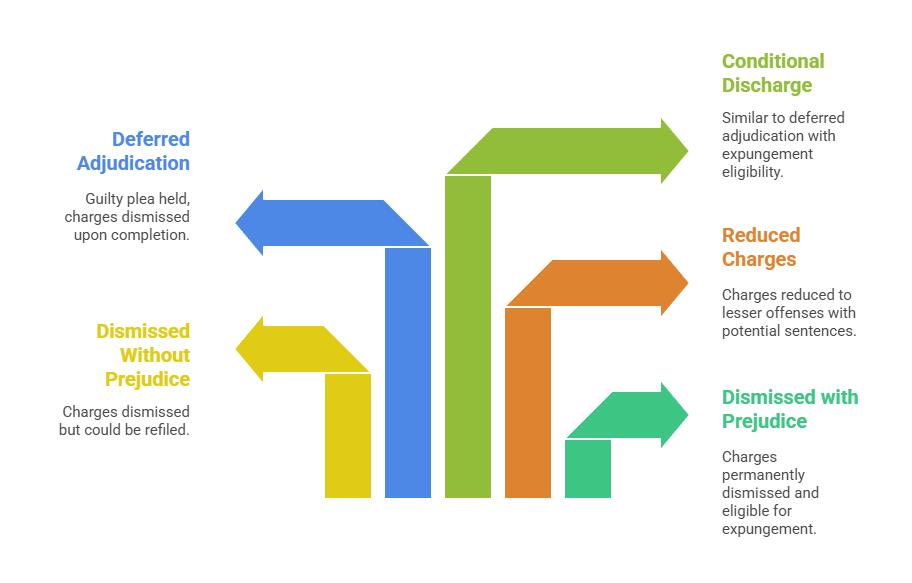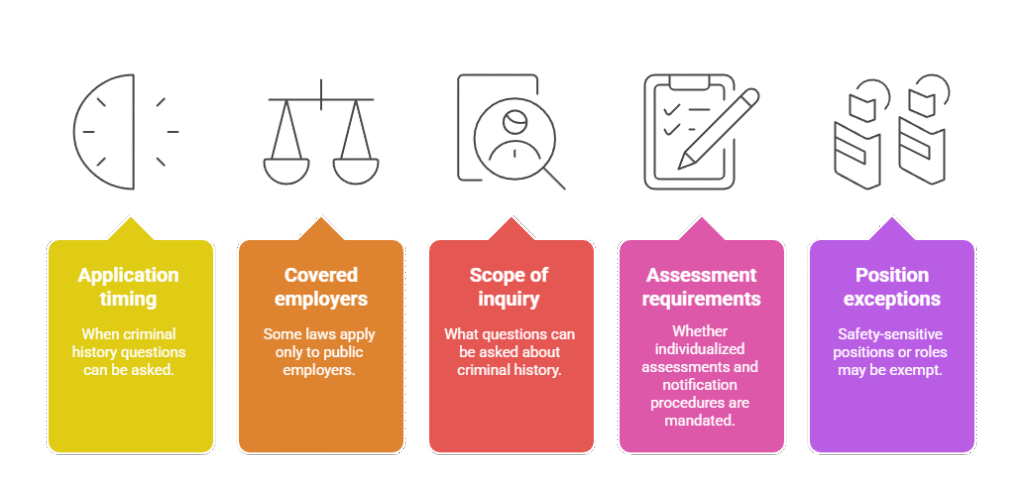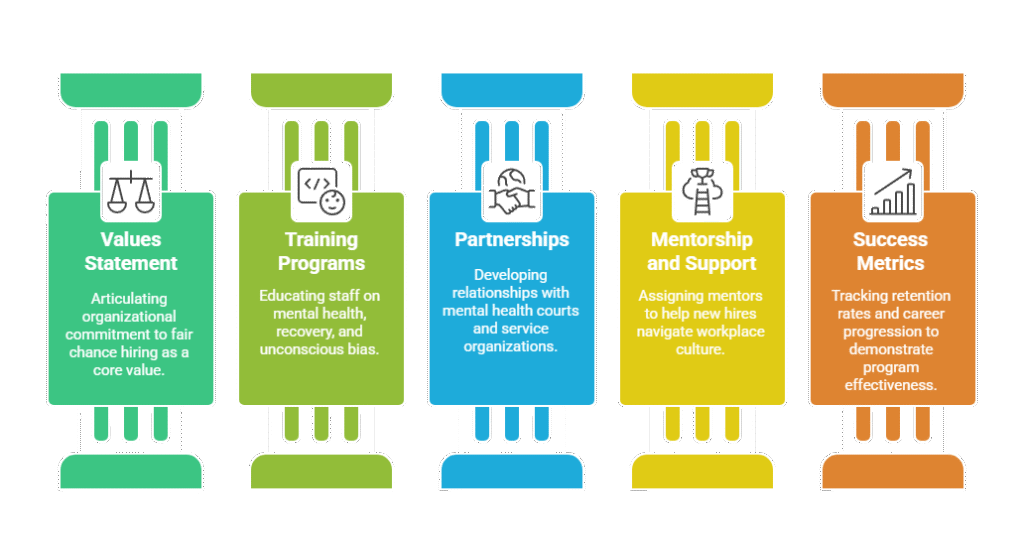Mental health court disposition employment considerations require hiring managers to balance thorough background screening with ADA compliance and fair chance hiring practices. Understanding the difference between therapeutic court participation, case dismissals, and convictions is essential for making legally compliant hiring decisions while supporting workforce inclusion.
Key Takeaways
- Mental health court dispositions often result in dismissed charges or diversionary outcomes that may not appear on standard background checks, unlike traditional convictions.
- The Americans with Disabilities Act (ADA) protects individuals with mental health histories from discrimination, requiring employers to evaluate job-relatedness before making adverse decisions.
- Therapeutic court programs including drug courts and mental health diversion programs focus on treatment rather than punishment, frequently leading to expunged or sealed records.
- Employers must conduct individualized assessments considering the nature of the offense, time elapsed, and position requirements before denying employment based on mental health court records.
- EEOC guidance and Ban the Box laws in multiple states restrict when and how employers can inquire about criminal history, particularly for therapeutic court participants.
- Implementing ADA-compliant screening policies protects organizations from discrimination claims while maintaining workplace safety and security standards.
Understanding Mental Health Court Dispositions
Mental health courts represent a specialized approach to criminal justice that diverts defendants with mental health conditions into treatment programs. These problem-solving courts emerged in the late 1990s. Over 400 jurisdictions nationwide operated mental health courts as of 2025. The disposition outcomes from these courts differ significantly from conventional criminal proceedings.
A mental health court disposition refers to the final outcome or resolution of a case handled through the therapeutic court system. Unlike standard criminal court, these dispositions frequently involve treatment completion requirements, compliance monitoring, and conditional dismissals. These outcomes prioritize rehabilitation over punitive measures, reflecting a public health approach to justice.
The distinction matters tremendously for employment purposes because mental health court participation does not automatically indicate a criminal conviction. Many participants successfully complete treatment programs and receive favorable dispositions including case dismissals, charge reductions, or expungements. Hiring managers who conflate mental health court involvement with criminal convictions risk violating anti-discrimination laws while excluding qualified candidates who have addressed their health needs through court-supervised treatment.
How Mental Health Courts Differ From Traditional Criminal Courts
Mental health courts operate on a fundamentally different philosophy than traditional criminal justice systems. Judges, prosecutors, defense attorneys, and treatment providers collaborate as a team rather than adversaries. The court monitors participants through regular status hearings, typically every two to four weeks. During these hearings, the judge reviews treatment progress, medication compliance, and community safety factors.
This collaborative model produces disposition outcomes that reflect treatment success rather than merely legal guilt or innocence. A participant who completes all program requirements might receive a full dismissal of charges, regardless of the strength of the initial case. Conversely, participants who struggle with compliance might face sanctions, additional treatment requirements, or program termination with the case returning to traditional court processing.
Mental health court participation typically requires voluntary agreement from the defendant, though the alternative of traditional prosecution creates significant pressure. Eligibility criteria vary by jurisdiction but generally include a diagnosed mental illness, connection between the condition and the alleged offense, and willingness to comply with treatment. The voluntary nature indicates acknowledgment of mental health needs and commitment to treatment, which forward-thinking employers recognize as positive indicators of self-awareness and wellness commitment.
EXPERT INSIGHT: As an HR practitioner, I’ve discovered that applicants sometimes bring experiences that exceed the information revealed during a background check. Dispositions after mental health courts indicate heartfelt change, not risk. As a practitioner, being compliant with the Americans with Disabilities Act and utilizing equitable hiring practices is important to me because I strive to view applicants not merely through the lens of a business operation but through a broader perspective of the entire person. - Charm Paz, CHRP
Types of Mental Health Court Dispositions
Understanding the specific disposition types helps employers interpret background check results accurately and make informed, legally compliant hiring decisions. Mental health court outcomes vary significantly based on jurisdiction, program completion status, and the nature of the original charges. Different dispositions carry different legal implications for employment screening purposes.
Successful program completers typically receive these favorable dispositions:

- Dismissed with Prejudice: Charges permanently dismissed and cannot be refiled; often available for expungement immediately.
- Dismissed Without Prejudice: Charges dismissed but could theoretically be refiled, though rarely occurs after program completion.
- Reduced Charges: Original charges reduced to lesser offenses, sometimes with time-served or probation sentences.
- Deferred Adjudication: Guilty plea held in abeyance; charges dismissed upon successful completion without conviction entering record.
- Conditional Discharge: Similar to deferred adjudication with completion resulting in dismissal and potential expungement eligibility.
Program non-completers face different outcomes as their cases return to traditional criminal court for standard prosecution. The variation across jurisdictions creates complexity for multi-state employers. Employers benefit from working with background screening companies that understand these nuances and provide clear explanations of disposition meanings rather than raw court data alone.
ADA Protections for Mental Health Court Participants
The Americans with Disabilities Act fundamentally shapes how employers approach hiring decisions involving mental health court dispositions. Mental illnesses qualify as disabilities under the ADA when they substantially limit major life activities, providing significant protections against employment discrimination. Employers must understand these protections to maintain compliance and avoid costly legal challenges.
Prohibition on Pre-Employment Medical Inquiries
The ADA strictly prohibits medical inquiries before making a conditional job offer. Employers cannot ask about mental health history, psychiatric treatment, or mental health court participation during application or interview stages. Questions must focus on ability to perform essential job functions with or without reasonable accommodation.
This prohibition extends to background check questions on applications. While employers can ask about criminal convictions after Ban the Box reforms, they cannot ask specifically about mental health court involvement or treatment programs. The criminal history inquiry must be neutrally worded without targeting disability-related judicial processes.
Individualized Assessment Requirements
The EEOC enforcement guidance requires individualized assessments before taking adverse action based on criminal history. Employers cannot apply blanket exclusions based on arrest records, charges that were dismissed, or non-conviction dispositions from therapeutic courts. Each case requires individual evaluation considering multiple factors.
| Factor | Consideration | Application to Mental Health Courts |
| Nature and gravity of offense | What was the underlying conduct and how serious? | Focus on conduct, not mental health diagnosis or court type |
| Time elapsed | How long ago did the conduct occur? | Consider both offense date and successful treatment completion |
| Nature of job sought | Does the position create specific risks related to the conduct? | Evaluate genuine job-relatedness, not assumptions about mental illness |
Employers must provide applicants an opportunity to present mitigating information including evidence of rehabilitation, treatment completion, time elapsed, and changed circumstances. Mental health court graduation certificates, treatment records if voluntarily provided, and reference letters from program staff constitute powerful rehabilitation evidence that employers should weigh favorably.
What Appears on Background Checks
The visibility of mental health court dispositions on employment background checks depends on multiple factors. Disposition type, jurisdiction reporting practices, time elapsed since disposition, and the thoroughness of the background screening conducted all affect visibility. Understanding what appears helps employers interpret results correctly and make appropriate decisions.
Successfully completed mental health court programs frequently result in dismissed charges that may or may not appear on background checks. This depends on the specific disposition language and subsequent expungement actions. Dismissed with prejudice charges sometimes remain visible in court records even though they did not result in conviction. Background check reports should clearly indicate "dismissed" status, distinguishing these outcomes from convictions.
Expunged or sealed records theoretically do not appear on background checks, though the reality proves more complicated. Court records may be sealed from public access while law enforcement databases retain the information. Some background screening companies access law enforcement databases that may contain expunged information, creating compliance issues. Applicants with expunged mental health court records legally can answer "no" to conviction questions in most jurisdictions.
Arrest Records vs. Conviction Records
Many mental health court participants enter programs after arrest but before conviction, completing treatment and receiving dismissals without convictions ever entering their records. The EEOC takes a strong position that arrest records without convictions should not be used for employment decisions because arrests alone do not establish that criminal conduct occurred. Some states prohibit employers from considering arrest records entirely or restrict their use to pending charges only.
Mental health court dispositions that include deferred adjudication create a gray area. Technically, deferred adjudication involves a guilty plea, but successful completion results in dismissal without conviction. Some jurisdictions treat these as non-convictions for employment purposes while others allow limited consideration.
Drug Court and Other Therapeutic Court Employment Considerations
Mental health courts represent one type within a broader category of problem-solving courts. Drug courts, veterans treatment courts, and co-occurring disorder courts operate on similar principles, creating parallel employment considerations for hiring managers. Understanding these variations helps employers develop comprehensive fair chance hiring policies.
Drug court employment background checks present similar challenges to mental health court screenings. Successful drug court graduates demonstrate commitment to recovery, treatment compliance, and lifestyle changes. Research shows drug court participants have significantly lower recidivism rates than traditionally sentenced defendants, making graduates potentially lower-risk employees. Employers should consider drug court completion positively, particularly when documented sobriety and treatment success can be verified.
Veterans treatment courts combine criminal justice and mental health or substance abuse treatment specifically for military veterans. These specialized programs address service-related trauma, PTSD, and transition difficulties contributing to criminal behavior. Employers should recognize that veterans treatment court graduation demonstrates significant rehabilitation and addresses the underlying factors that led to the original charges. Many employers actively recruit veterans, and treatment court graduation should not disqualify veteran applicants who have successfully addressed their challenges.
Ban the Box Laws and Fair Chance Hiring
Ban the Box legislation significantly impacts how employers can inquire about mental health court dispositions. These laws restrict when and how employers can ask about criminal history during the hiring process. As of 2025, 37 states and over 150 cities have enacted Ban the Box laws with varying requirements.
The core principle requires removing conviction history questions from initial applications, delaying criminal background inquiries until later hiring stages. Typically this occurs after a conditional job offer. The policy ensures applicants receive consideration based on qualifications before criminal history creates bias. For mental health court participants, Ban the Box provides opportunity to present qualifications and demonstrate fitness for positions before any discussion of therapeutic court involvement.
Ban the Box laws vary significantly in their requirements:

- Application timing: When criminal history questions can be asked (after initial screening, after interview, after conditional offer)
- Covered employers: Some laws apply only to public employers while others include private employers above certain size thresholds
- Scope of inquiry: What questions can be asked (convictions only, pending charges, arrests, diversions)
- Assessment requirements: Whether individualized assessments and notification procedures are mandated
- Position exceptions: Safety-sensitive positions or roles with regulatory background check requirements may be exempt
Employers operating in multiple jurisdictions must comply with the strictest applicable standard. A company with locations in both California and a state without Ban the Box should consider adopting the California standard company-wide to ensure consistent, compliant processes.
Implementing Compliant Screening Policies
Developing ADA-compliant, fair chance hiring policies for mental health court dispositions requires careful planning. Policy drafting must be precise and comprehensive. Staff training ensures consistent implementation, while regular auditing maintains ongoing compliance.
Clear policy documentation forms the foundation of compliant screening. Written policies should specify when criminal background checks are conducted, what information is considered, and how decisions are made. This ensures consistent application across all hiring managers and positions while demonstrating good faith compliance efforts.
Staff training ensures everyone involved in hiring understands their responsibilities. HR personnel, hiring managers, and recruiters need training on ADA requirements, Ban the Box laws, and the difference between arrests and convictions. Training should cover how to conduct individualized assessments and address unconscious bias about mental health court participants.
| Policy Element | Best Practice | Compliance Benefit |
| Timing of inquiry | After conditional offer or as late as law allows | Complies with Ban the Box; reduces bias |
| Question wording | Focus on convictions only; neutral language | Avoids ADA violations; meets EEOC guidance |
| Assessment process | Documented individualized evaluation using Green factors | Demonstrates good faith; defends decisions |
| Staff training | Annual training on ADA, Ban the Box, bias | Reduces inadvertent violations; consistent application |
Expungement and Record Sealing for Mental Health Court Records
Expungement and record sealing provide mechanisms for mental health court participants to limit employment impact of their therapeutic court involvement. These legal processes remove or restrict access to criminal records. Understanding these processes helps employers respond appropriately when applicants disclose expunged records or when sealed information inadvertently appears in background checks.
Expungement legally destroys or seals court and arrest records related to specific charges or convictions. Successfully expunged records are treated as though the arrest or conviction never occurred. Individuals with expunged mental health court records can truthfully answer "no" to questions about criminal history in most circumstances, with limited exceptions for specific regulated positions or security clearances.
Expungement eligibility and procedures vary dramatically across states:
- California offers expungement through Penal Code Section 1203.4 for individuals who successfully complete probation, including mental health court probation.
- Pennsylvania's Clean Slate law provides automatic sealing of eligible non-conviction records and certain convictions after 10 years.
- New Jersey expanded expungement access in 2019, reducing waiting periods and increasing the number of eligible offenses.
- Michigan implemented automatic expungement in 2023 for certain convictions after waiting periods, including some therapeutic court dispositions.
Employers must understand their state's expungement laws to respond appropriately when expunged information appears in background checks. Using expunged information for employment decisions violates most state laws and can result in penalties, lawsuits, and damages awards.
Position-Specific Considerations
The job-relatedness analysis required by EEOC guidance means that mental health court dispositions may have different implications for different positions. Hiring managers must evaluate whether the underlying conduct relates to the particular job rather than applying blanket exclusions. This requires understanding essential job functions and specific safety or security concerns.
Safety-sensitive positions may justify greater scrutiny of certain mental health court dispositions. Positions involving operation of heavy machinery, transportation of passengers, or security responsibilities require careful evaluation. However, employers must focus on whether the underlying offense involved violence, impaired operation of vehicles, or behaviors directly related to the position's safety requirements rather than the mental health court participation itself.
| Position Category | Typical Relevance | Assessment Focus |
| Office/Administrative | Generally low relevance unless disposition involves theft, fraud, or workplace violence | Focus on time elapsed and treatment completion |
| Customer-Facing Sales | Low to moderate depending on underlying conduct | Consider theft/fraud more carefully; interpersonal violence may be relevant |
| Healthcare/Education | Moderate to high depending on offense nature and regulatory requirements | Review regulatory restrictions; vulnerable population considerations |
| Transportation/CDL | Moderate to high for substance-related or impaired operation offenses | Focus on sobriety maintenance; drug court graduation often positive |
| Financial Services | Higher relevance for theft, fraud, or financial crimes | Time elapsed and rehabilitation evidence critical |
Financial industry positions subject to FINRA regulations face specific statutory disqualifications for certain convictions. However, most mental health court dispositions result in dismissals rather than convictions, which typically do not trigger statutory bars.
Building an Inclusive Hiring Strategy
Organizations committed to diversity, equity, and inclusion increasingly recognize that fair chance hiring practices align with broader DEI objectives. Mental health conditions affect approximately 1 in 5 adults annually according to NIMH data. Criminal justice involvement disproportionately impacts communities of color and individuals with disabilities, making exclusion of mental health court participants a significant equity issue.
Developing an inclusive hiring strategy requires intentional policy design and leadership support. Fair chance hiring represents a values-driven approach that may face initial resistance from risk-averse managers or staff with misconceptions about mental health court participants. Education about therapeutic courts and their success rates helps overcome resistance and build organizational confidence.
Components of an effective inclusive hiring strategy include:

- Values statement: Articulate organizational commitment to fair chance hiring as a core value, explaining alignment with mission and community impact goals.
- Training programs: Educate hiring managers, HR staff, and team members about mental illness, recovery, therapeutic courts, and unconscious bias.
- Partnerships: Develop relationships with mental health courts, treatment providers, and reentry service organizations to create candidate pipelines.
- Mentorship and support: Assign mentors to help new hires with criminal justice histories navigate workplace culture and access resources.
- Success metrics: Track retention rates, performance outcomes, and career progression to demonstrate program effectiveness.
Several major employers have implemented successful fair chance hiring initiatives that include mental health court graduates. JPMorgan Chase's Second Chance program has hired thousands of individuals with criminal records, reporting retention rates comparable to other employees.
Legal Risks and Compliance Best Practices
Employers face legal exposure from both overly restrictive policies and insufficiently thorough screening. Overly restrictive policies exclude mental health court participants inappropriately, violating ADA and fair chance laws. Insufficient screening may miss relevant information, creating potential negligent hiring liability. Balancing these competing risks requires understanding the legal landscape and implementing defensible practices.
The primary legal risks include ADA discrimination claims, Title VII disparate impact claims, state and local fair chance law violations, negligent hiring claims, and FCRA violations. ADA discrimination claims can result when mental health court participation leads to adverse action without proper individualized assessment. Title VII disparate impact claims arise when criminal background check policies disproportionately exclude protected groups, particularly racial minorities who are overrepresented in the justice system.
Best practices to minimize legal risks include conducting background checks only after conditional offers unless exempted by industry regulations, using PBSA-accredited background screening companies, implementing individualized assessment procedures with documentation, providing pre-adverse action notices, training decision-makers on applicable laws, periodically auditing policies, and consulting employment counsel when questions arise. Documentation is crucial for defending employment decisions and demonstrating good faith compliance efforts.
The Future of Mental Health Court Employment Screening
The intersection of mental health court dispositions and employment screening continues evolving as therapeutic courts expand and criminal justice reform advances. Several trends will shape this landscape over the next decade. Understanding these trends helps employers prepare for future developments and position their organizations as leaders in fair chance hiring.
Automatic record sealing and expungement laws are expanding nationwide. Clean Slate legislation automatically seals eligible records without requiring individuals to petition courts. Pennsylvania, Michigan, Utah, and other states have implemented these laws, with additional states considering similar legislation. These laws particularly benefit mental health court graduates whose dismissals may automatically seal within months of completion.
Mental health parity in employment policies represents a growing focus. Employers increasingly recognize substance use disorders as health conditions rather than moral failings. Similarly, mental illness is gradually being destigmatized in workplace contexts. This cultural shift supports viewing mental health court participation as evidence of proactive health management rather than disqualifying criminal involvement.
AI and algorithmic hiring tools introduce new considerations for mental health court dispositions. Automated screening systems that categorically exclude applicants with any criminal justice involvement may disproportionately impact individuals with mental health disabilities, creating ADA and Title VII risks. Employers using AI screening must ensure algorithms allow for nuanced consideration of non-convictions, dismissals, and case context rather than binary exclude/include determinations.
Conclusion
Mental health court disposition employment screening requires balancing thorough background evaluation with legal compliance and fair chance principles. Employers who understand the distinctions between convictions and dismissals will make better hiring decisions while accessing qualified talent. Implementing ADA-compliant individualized assessments protects organizations legally while demonstrating commitment to workplace inclusion. The understanding of the therapeutic aspects of these court programs also serves to inform employers that job applicants are already well along the road to rehabilitation and stability. Organizations that take these applicants into account are not merely adhering to the letter of the law, but are themselves helping applicants achieve success. As criminal justice reform and workplace inclusion priorities advance, organizations that proactively develop fair, compliant policies will demonstrate leadership in building diverse, inclusive workforces that benefit both business outcomes and community impact.
Frequently Asked Questions
Do mental health court records show up on background checks?
Mental health court records may or may not appear on employment background checks depending on the disposition type and jurisdiction. Successfully completed programs often result in dismissed charges or expunged records that should not appear on standard criminal background checks. However, arrest records and court case information sometimes remain visible even after dismissal unless specifically expunged or sealed. The key distinction is that mental health court participation typically does not result in a criminal conviction, which is what most employers are legally permitted to consider. Employers should focus on convictions rather than arrests or dismissed charges when evaluating background check results.
Can employers discriminate against mental health court participants?
Employers cannot discriminate based on mental health disabilities under the Americans with Disabilities Act, which often applies to mental health court participants. Making adverse employment decisions solely because someone participated in mental health court likely violates the ADA's prohibition on disability discrimination. Employers must conduct individualized assessments focusing on whether the underlying conduct relates to specific job requirements rather than categorically excluding mental health court participants. The EEOC has issued enforcement guidance requiring employers to evaluate the nature of the offense, time elapsed since completion, and job-relatedness before making decisions based on criminal history that may involve mental health disabilities.
What is the difference between mental health court and drug court for employment purposes?
Mental health courts and drug courts are both therapeutic court programs using treatment rather than incarceration, creating similar employment considerations. Mental health courts specifically address defendants with diagnosed mental illnesses while drug courts focus on substance use disorders, though significant overlap exists between the populations. For employment screening, both types of therapeutic courts often result in dismissed charges upon successful completion, and both participant groups are protected under the ADA. Mental health court participants are protected as individuals with mental disabilities, while drug court graduates are protected as individuals in recovery from substance use disorders. Employers should evaluate both types of therapeutic court participation similarly, focusing on successful treatment completion as evidence of rehabilitation.
How should hiring managers handle expunged mental health court records?
Hiring managers should completely disregard expunged mental health court records if they inadvertently appear on background checks, as most state laws treat expunged records as though the arrest or charge never occurred. Applicants with expunged records can legally answer "no" to conviction questions, and employers who use expunged information for hiring decisions violate expungement statutes in most jurisdictions. If expunged information appears in a background check report, contact the screening company to understand why sealed records were reported and ensure processes are corrected. Never ask applicants about expunged records or make employment decisions based on information that should have been sealed.
Are there positions where mental health court dispositions automatically disqualify candidates?
Very few positions involve automatic disqualification based solely on mental health court dispositions, though certain regulated industries have statutory restrictions based on convictions for specific offenses. Most mental health court programs result in dismissals rather than convictions, which typically do not trigger regulatory bars. Healthcare licensing boards, financial industry regulators, and education departments sometimes restrict employment for individuals with certain convictions, but employers must verify whether dismissed charges from mental health court fall within these restrictions before assuming disqualification. Even for regulated positions, individualized assessment is usually required unless specific statutory language mandates categorical exclusion.
What documentation can applicants provide to explain mental health court participation?
Applicants can provide mental health court graduation certificates, program completion letters, treatment provider references, and documentation of services completed to explain their therapeutic court participation. These materials demonstrate successful rehabilitation and provide context for hiring managers conducting individualized assessments. Court orders showing dismissed charges, expungement documents, and letters from supervising judges or case managers offer additional verification of positive program completion. Applicants should be prepared to explain the circumstances that led to mental health court participation, the treatment and services received, and how they have addressed the underlying issues.
How long should employers wait after mental health court completion before hiring someone?
No specific mandatory waiting period exists after mental health court completion before employers can hire someone, and successful program completion should generally be viewed favorably rather than requiring additional waiting time. The EEOC's Green factors include "time elapsed" as one consideration, but this refers to time since the underlying offense rather than a minimum waiting period before employment eligibility. Mental health court graduates who have successfully completed treatment, maintained stability, and demonstrated rehabilitation may be hired immediately after program completion. In fact, employment is often a required component of mental health court programs, with many participants securing jobs during their supervision period.
Do Ban the Box laws protect mental health court participants?
Ban the Box laws provide significant protections for mental health court participants by delaying criminal history inquiries until later in the hiring process and requiring individualized assessments before adverse decisions. These laws ensure that mental health court participants receive consideration based on their qualifications before any criminal history discussion occurs. Because mental health court often results in dismissed charges rather than convictions, many participants may have no convictions to report even when criminal history questions are eventually asked. Ban the Box laws in jurisdictions like California, New York, and Massachusetts specifically prohibit consideration of arrests that did not lead to convictions, providing additional protection for mental health court participants whose cases were dismissed.
Additional Resources
- National Association of Drug Court Professionals - Mental Health Courts
https://www.nadcp.org/mental-health-courts - Council of State Governments Justice Center - Behavioral Health Resources
https://csgjusticecenter.org/projects/behavioral-health - Equal Employment Opportunity Commission - ADA and Criminal Records
https://www.eeoc.gov/laws/guidance/enforcement-guidance-consideration-arrest-and-conviction-records - Substance Abuse and Mental Health Services Administration - Recovery Resources
https://www.samhsa.gov/find-help/recovery - National Institute of Mental Health - Mental Health Statistics
https://www.nimh.nih.gov/health/statistics - Clean Slate Initiative - Automated Record Clearance Information
https://cleanslateinitiative.org - American Bar Association - Criminal Justice Section Mental Health Court Resources
https://www.americanbar.org/groups/criminal_justice/behavioral_health - National HIRE Network - Legal Resources for People with Criminal Records
https://hirenetwork.org - Center for Employment Opportunities - Fair Chance Hiring Best Practices
https://ceoworks.org - JPMorgan Chase Second Chance Hiring Initiative
https://www.jpmorganchase.com/impact/people/second-chance

GCheck Editorial Team
Meet the GCheck Editorial Team, your trusted source for insightful and up-to-date information in the world of employment background checks. Committed to delivering the latest trends, best practices, and industry insights, our team is dedicated to keeping you informed.
With a passion for ensuring accuracy, compliance, and efficiency in background screening, we are your go-to experts in the field. Stay tuned for our comprehensive articles, guides, and analysis, designed to empower businesses and individuals with the knowledge they need to make informed decisions.
At GCheck, we're here to guide you through the complexities of background checks, every step of the way.






